Crocodiles are reptiles, and they share similar traits with other members of the group, including the ability to shed.
They must also lose their skin as a necessary component of their life cycle.
Crocodiles shed their old skin to make room for new ones. Because they require their scales for protection from the sun, animals, environments, and fellow crocodiles, they shed them separately.
This is different from other animals which lose all of theirs at once.
Read on to learn some interesting details regarding how and why crocodiles shed their skin.
Do Crocodiles Shed Their Skin?
Crocodiles shed their skin, but it doesn’t molt all at once like snakes. They rub themselves against hard, rough surfaces like the bark of trees and rocks. Individual scales can then fall off.
The crocodile’s skin is unique in a way that could be surprising. Although it gives off the impression of being thick and robust, the skin is actually how delicate and touchy.
Their ability to feel touch is thought to be due to the pigmented domes that are found throughout their bodies as brain-connected dots.
When the skin comes into contact with another surface, this dot sends impulses to the brain’s receptors, giving them the sensitivity they need during the reproduction period, when female crocodiles carry their eggs in their jaws for protection and to hatch them. 1
Who would believe that a creature with such a spooky appearance and rugged exterior could be so delicate and touchy? This a classic case of not judging a book by its covers.
What are Crocodile Skins Made of?
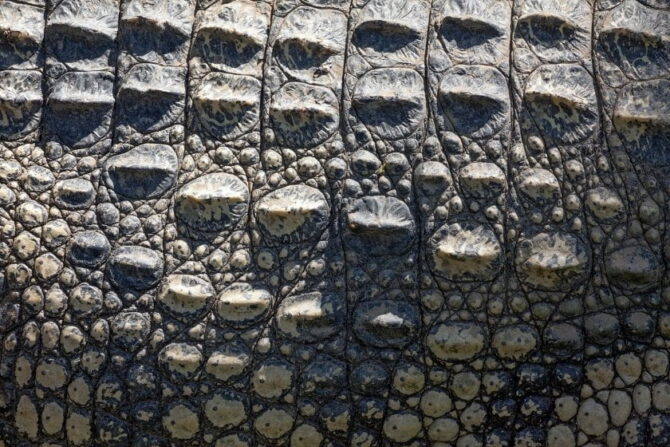
The crocodile’s skin is made of SCUTES or hardened skin patches. It is filled with fragments of scutes, which are made of keratin and occur in various sizes and shapes.
Scutes require a larger skin to accommodate their growth; therefore, the skin also expands as they do.
Scutes resemble scales in appearance and serve similar purposes like making the body waterproof, providing excellent camouflage, and shielding the skin from the sun while crocodiles wait for their food.
How Do Crocodiles Shed Their Skin?
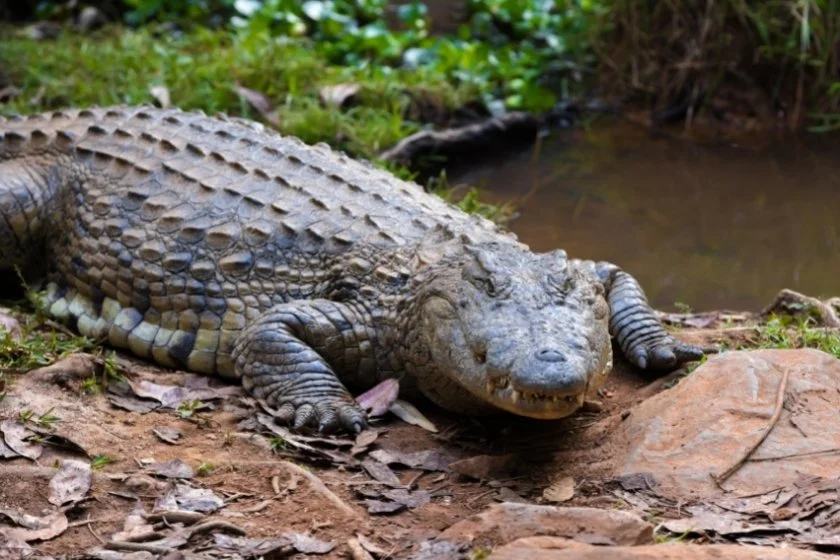
All reptiles typically shed their skin, which takes place at various periods of the year, depending on the ambient temperature.
For more clarity, the stages of the shedding process are outlined below:
- The initial phase: Because crocodiles are nocturnal animals, they are still actively protecting their skin and camouflaging throughout the night in this phase. The crocodile is also free to move about in its habitat.
- The breaking phase: This is when the scutes start to look dull and lose color. This could be a sign of the crocodiles’ aging process. The age of sexual maturity is between 4 and 12 years. Crocodiles typically live between 20 and 70 years, and during this time, they get longer.
- The Shedding Phase: Rather than being shed all at once, the old skin is removed in bits and pieces during this phase. The crocodiles rub their scutes on rocks or tree bark to remove the old ones. For the scutes to come off, they must scrape them against a rough surface. After the old scutes are shed, the new ones grow thicker and stronger.
Why Is Shedding Important For Crocodiles Skin?
There are additional significant reasons why a crocodile sheds its skin in addition to the fact that it is an essential aspect of their biological process, such as:
- Gaining weight
- Camouflage
- Providing shade from the hot sun
- Room for skin and scutes to be healthier
Frequently Asked Questions
What happens when crocodiles shed their skin?
The new skin is created when the old one is shed. Typically, the new ones are denser than the old ones.
What causes crocodiles to shed their skin?
In contrast to human skin, which stretches with age and develops wrinkles, reptiles like crocodiles are a little more complicated because they must shed older, thinner scutes to make place for new, thicker ones.
What is crocodile skin made of?
Scutes, non-overlapping scales made of keratin, are bony plates covering the skin.
Do crocodiles get skinned alive?
Crocodile skin is in high demand by clothing and design organizations. It is considered to be costly leather and is widely in need commercially for different purposes as well as for beautification. Sadly, most times, crocodiles are skinned alive by these companies for their durable skin, which is used to produce different fashion wears or outfits from shoes to handbags and belts.
Are all reptiles skin-shedding animals?
The condition of shedding is a lifelong occurrence for all animals. It removes old skin and the subsequent growth of new, healthy skin. All reptiles occasionally shed the top layer of their skin.
Do crocodiles get skinned alive?
Organizations involved in fashion and design are very interested in crocodile skin. Unfortunately, these businesses frequently skin alive crocodiles for their tough skin, which is used to create a variety of fashionable clothing and accessories, including shoes, handbags, and belts. It is regarded as costly leather and is extensively used in commerce for various functions, including attractiveness.
Do crocodiles shed tears?
Crocodiles indeed cry but don’t do it out of sorrow or remorse for attacking and devouring their prey. Their lacrimal glands release a fluid that helps protect the eye from infection and keeps their eyes lubricated because they spend a lot of time beneath water.
Do crocodiles shed their teeth?
Crocodiles do lose their teeth. They don’t brush their teeth like people to keep them healthy and clean. Instead, they remove them and put new ones in their place. Each month or two, they perform this.
Wrap Up
Because of their Integumentary Sensory Organs (ISOs), crocodiles are highly suited to their environments. 2
They can live up to 100 years in captivity as well as 70 years in the wild. Crocodiles only totally lose a portion of their skin at a time. We don’t see them when they shed their skin because they do it largely underwater.
They age without suffering. Therefore, crocodiles can periodically replace their scutes (skin) by rubbing their backs against rough objects and trees until they fall off.
Next Up…
- Are Crocodiles Bulletproof? How Thick Is Crocodile Skin?
- Do Alligators Shed Their Skin? [Answered]
- Are Alligators Bulletproof? How Thick Is Alligator Skin?
References & Notes
- Despite their thick skins, alligators and crocodiles are surprisingly touchy, 2012. [online] Vanderbilt University.
- Duncan L. and Kenneth C., 2012. Structure, innervation and response properties of integumentary sensory organs in crocodilians, The Journal of experimental biology, 215(Pt 23), 4217–4230. https://doi.org/10.1242/jeb.076836.
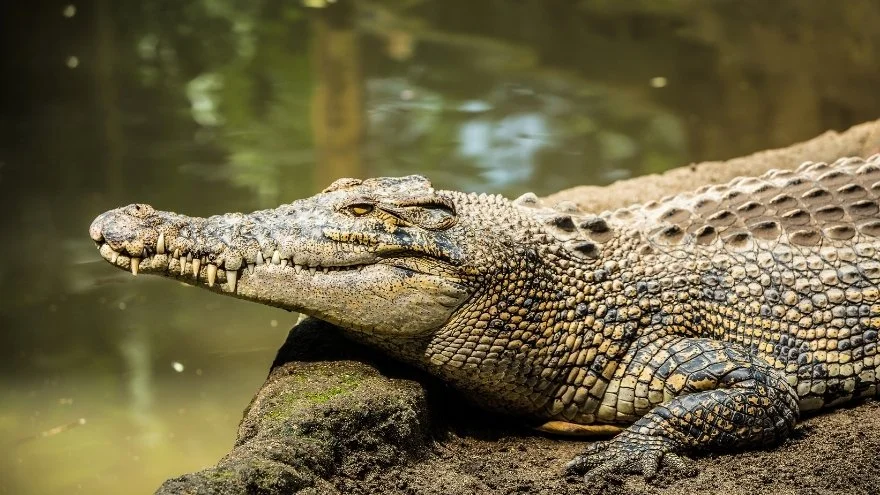
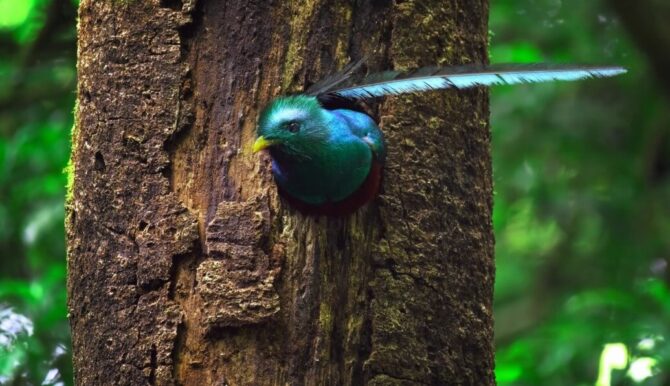



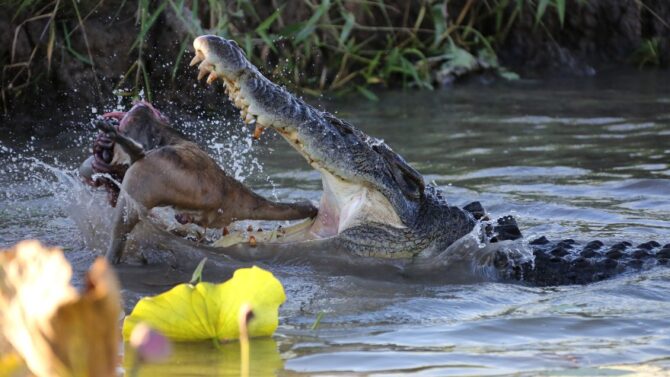
![Do Crocodiles Have Tongues & Taste Buds [Answered]](https://animalvivid.com/wp-content/uploads/2022/10/Do-Crocodiles-Have-Tongues-Taste-Buds-Answered.jpg.webp)